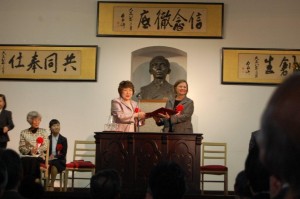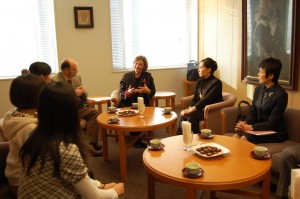Greetings from Tokyo, where it is a sunny autumn day. This past Saturday, I had the privilege of receiving the first honorary degree given by Japan Women’s University, where I addressed students, faculty, and alumnae on the 110th anniversary of this distinguished institution. I also enjoyed the opportunity to meet  with many Wellesley alumnae in Tokyo.
with many Wellesley alumnae in Tokyo.
This is my second trip to Japan; the first was a visit guided by my former postdoctoral students, who had returned to Japan after completing immunology training at my laboratory at Yale. This time I had the good fortune to be led by Yoshiko Arikawa, President of Japan Women’s University, where I was given a tour of the campus, strolled the spectacular Izumi Float Garden, visited an analytical chemistry lab class, and enjoyed tea with young women who will be studying at Wellesley as part of our international exchange program. In the past few days I have been moved, as I was the first time, by this beautiful city with its magnificent history, and by the enduring spirit of the people I’ve met.
As I said in my speech, I have been struck by the similar philosophies, educational principles, and convictions shared by our two institutions. We are geographically separated, but Japan Women’s University and Wellesley College are sisters in our mission. The commitment to educating women has  transcended any of our cultural differences throughout the last century. When Jinzo Naruse opened Japan’s first women’s university in 1901, he wanted to revolutionalize education for women in Japan—and, in turn, women’s freedom and opportunities. Similarly, soon after the visionary Henry Durant opened the doors to Wellesley in 1875, he declared, “The higher education of women is one of the great world battle cries for freedom, for right against might.” Our links are very direct. Jinzo Naruse spent time at Wellesley College in the late 1800s, and he was inspired by what Henry Durant had accomplished. He returned to Japan and founded JWU.
transcended any of our cultural differences throughout the last century. When Jinzo Naruse opened Japan’s first women’s university in 1901, he wanted to revolutionalize education for women in Japan—and, in turn, women’s freedom and opportunities. Similarly, soon after the visionary Henry Durant opened the doors to Wellesley in 1875, he declared, “The higher education of women is one of the great world battle cries for freedom, for right against might.” Our links are very direct. Jinzo Naruse spent time at Wellesley College in the late 1800s, and he was inspired by what Henry Durant had accomplished. He returned to Japan and founded JWU.
I also noted in my speech that Japan Women’s University and Wellesley College share an important history of educating women who make a difference in their communities and the world—but we share an even more important future. In these complex and perilous times, we need great leaders. And in the 21st century, women will have to be full partners leading with men, active designers and architects of a new, global society. The world’s leadership core emerges from the educated, from those who are lifelong learners. Wellesley women and the women of Japan Women’s University are among a core group who will take the lead to make the world a better place.
On my final day in Tokyo, just a few days before Thanksgiving, I am grateful for the partners we have in institutions like Japan Women’s University. I am thankful to President Yoshiko Arikawa for the kindness she has shown me during my time here. And I am inspired by the better future I can envision, which will be made possible thanks to the voices, perspectives, and ideas of the women we will send out into the world. Together, our institutions will continue to work to provide the great women leaders that are so desperately needed.